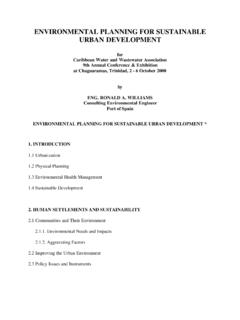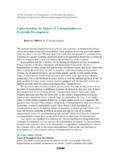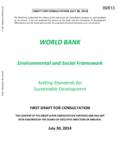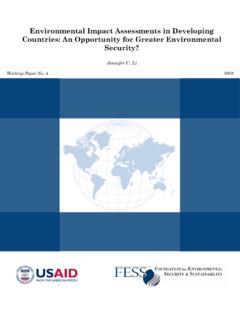Transcription of ENVIRONMENTAL PERFORMANCE REVIEW OF THE …
1 T H E O E C D E N V I R O N M E N T P R O G R A M M E 1 ENVIRONMENTAL PERFORMANCE REVIEW OF THE NETHERLANDS EXECUTIVE SUMMARY The Netherlands, which has a very open economy, experienced rapid expansion during the last ten years. It is the world s sixth largest exporting country, and its gross domestic product (GDP) is the world s 14th highest. The Netherlands has become a hub of international commerce, with a transport infrastructure centred on the port of Rotterdam (the busiest port in the world) and Amsterdam-Schiphol airport. Very high densities of both population and economic activities have led to very intense pressures on the country s environment.
2 Together with the delicate geographical balance between land and water, these pressures have made ENVIRONMENTAL protection a matter of serious public concern. ENVIRONMENTAL issues have a strong international dimension in the Netherlands, reflecting regional ENVIRONMENTAL interdependencies ( transboundary air and water pollution, North Sea pollution), regional economic interdependencies (EU membership, the country s role as a gateway to Europe) and global ENVIRONMENTAL issues ( vulnerability to climate change and sea level rise, the importance of trade and ENVIRONMENTAL aid). Since the early 1990s, the Netherlands has made considerable progress in decoupling a number of ENVIRONMENTAL pressures from economic growth and meeting several of its ambitious ENVIRONMENTAL targets.
3 This progress reflects the reshaping of the Dutch economy and the strengthening of ENVIRONMENTAL policies, including in the EU context. Today priority ENVIRONMENTAL issues include: loss of biodiversity, climate change, over-exploitation of natural resources, threats to human health and external safety, damage to the quality of life, and possible unmanageable risks. Several of these issues reflect pressures on the environment deriving from the Netherlands development choices, such as intensive agriculture and transport. It will be necessary for the Netherlands to: i) improve the cost-effectiveness of its ENVIRONMENTAL policies; ii) further integrate ENVIRONMENTAL concerns into economic and social decisions; and iii) reinforce its international ENVIRONMENTAL co-operation on ENVIRONMENTAL issues.
4 This report examines progress made by the Netherlands since the previous OECD ENVIRONMENTAL PERFORMANCE REVIEW in 1995, and the extent to which the country s domestic objectives and international commitments are being met. It also reviews progress in the context of the OECD ENVIRONMENTAL Strategy. Some 52 recommendations are made that could help strengthen the Netherlands ENVIRONMENTAL PERFORMANCE in the context of sustainable development. Despite a number of ENVIRONMENTAL In the last ten years the Netherlands has met or come close to meeting a number of its domestic objectives ( concerning SO2 emissions, toxic air contaminants, groundwater depletion, flood protection, phosphorus concentrations in water, expansion of the ecological network) and international commitments ( transboundary air pollution and North Sea targets).
5 The ENVIRONMENTAL Management Act (EMA) provides a framework for co-ordinating ENVIRONMENTAL legislation, though water, soil and nature management are subject to specific legislation. New regulations establish corporate financial liability for ENVIRONMENTAL damage. At the central level enforcement staff recently increased by 10%, following regrouping of the ENVIRONMENTAL , spatial planning and housing inspectorates; the number of inspections has also increased and penal sanctions have been applied. To maintain their incentive function, fine levels have been made proportionate to the size of the company. As a result, compliance levels have increased.
6 Inspection and prosecution pay particular attention to the movement of dangerous goods. ENVIRONMENTAL taxes ( on groundwater, landfill) and a regulatory energy tax have been introduced and other taxes are under discussion. Charges apply to point and diffuse water pollution, and producer responsibility has been extended to a range of waste streams. Overall, economic and fiscal instruments are used widely in the Netherlands. A new spatial planning policy to control urban development and protect landscape areas was issued in 2000. Overall, industry has been responsive and often proactive in improving its ENVIRONMENTAL PERFORMANCE , particularly through ENVIRONMENTAL agreements ( covenants) and ENVIRONMENTAL management and auditing; there are also ENVIRONMENTAL reporting obligations for companies.
7 The customised licensing system introduced in 1995 reflects a shift from regulatory approaches to monitored self-regulation. ENVIRONMENTAL agreements, which are more or less binding substitutes for regulation, have been successful in a number of areas in the Netherlands; long-term ENVIRONMENTAL objectives have been agreed with industry in a series of branch agreements, and the contributions expected from individual companies have T H E O E C D E N V I R O N M E N T P R O G R A M M E 2 been included in their operating permits. Flexibility in meeting objectives, and a stable investment context, have made these schemes attractive to firms.
8 The characteristic policy mix of regulation/licensing plus economic instruments plus ENVIRONMENTAL agreements continues to be productive. The gradual move to de-emphasise ENVIRONMENTAL agreements and regulation (arising from economic liberalisation and greater European and international integration) and to place more emphasis on economic instruments has merit, especially as it takes advantage of the government s strength in establishing frameworks rather than micro-managing.. future ENVIRONMENTAL policies could be more cost-effective However, despite this positive picture the Netherlands has not met several of its commitments or is not on the way to meeting them ( for CO2, NH3, NOx and VOC emissions, nitrogen inputs to water, nature protection, green space in urban areas).
9 Many of the previous National ENVIRONMENTAL Policy Plan targets for emission reductions and for ENVIRONMENTAL quality have been postponed or revised. Water management and nature conservation objectives are being addressed separately, reflecting the institutional setting. As a result, integration of nature and water management initiatives in central and local land use planning ( water areas for flood prevention, green areas for nature conservation) has been weak. Licensing of groundwater abstraction and waste water discharge is not covered by the EMA and has remained separate from integrated air, noise and waste licensing. There is a somewhat unclear split of enforcement and licensing responsibilities among the central, provincial and municipal levels in this relatively small country, though administrative agreements have been signed to enhance co-operation among enforcement partners.
10 Customised licensing (based on overall pollution reduction targets) applying to the 100 top companies (mostly multinational) conflicts with the IPPC logic that requires BAT standards for each individual production process. Fines are too low to prevent illegal traffic linked to international trade ( CITES, Basel Convention). There has been a tendency to focus on fiscal rather than economic instruments, with no air emission charges, user charge levels with little effect on water consumption, and flat rates applied to municipal waste collection charges. Implementation of ENVIRONMENTAL agreements should be accompanied more systematically by transparency mechanisms and the threat of penalties, such as levying of an energy tax, in cases of non-compliance with targets.
















